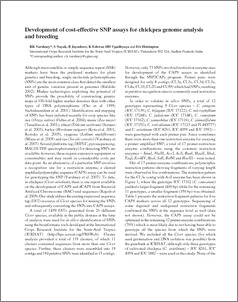Development of cost-effective SNP assays for chickpea genome analysis and breeding
Abstract
A total of 1499 ESTs generated from 26 different Cicer species, available in the public domain at the time of analysis, were used for in silico identification of SNPs using the bioinformatic tools developed at the International Crops Research Institute for the Semi-Arid Tropics (ICRISAT) (http://hpc.icrisat.org/PBSWeb). Cluster analysis provided a total of 118 clusters, of which 11 clusters contained sequences from more than one Cicer species. Further, these clusters were assembled into 19 contigs and 184 putative SNPs were identified in 15 contigs. However, only 73 SNPs involved restriction enzyme sites for development of the CAPS assays as identified through the SNP2CAPs program. Primer pairs were designed for only 8 contigs (CL3a, CL3c, CL3d, CL3e, CL4a, CL10, CL20 and CL99) which had SNPs, resulting in putative recognition sites to commonly used restriction enzymes. Results of the demonstrates the utility of Cicer EST resources and the availability of bioinformatics analysis pipelines for the large-scale identification of SNPs on the HPC (High Performance Computer) at ICRISAT and the development of costeffective CAPS assay for SNP genotyping. It is anticipated that the availability of large number of ESTs from more than one genotype of cultivated chickpea (C. arietinum) in the near future will make it possible to develop larger number of SNPs in cultivated chickpea germplasm for genome analysis and breeding applications

